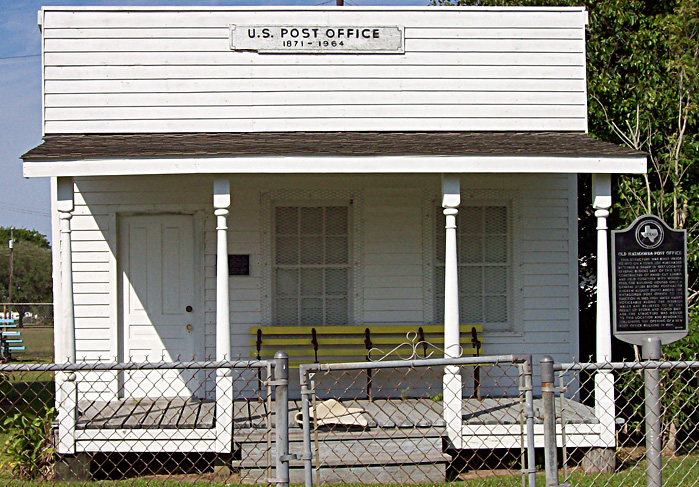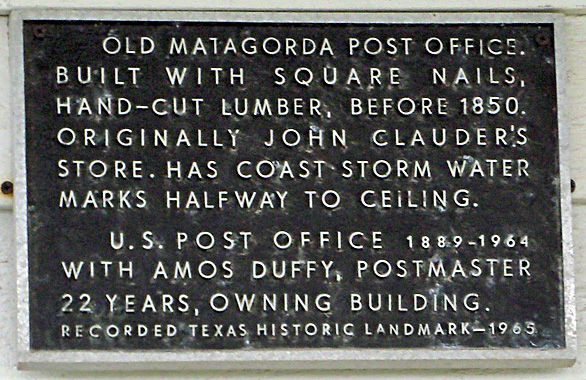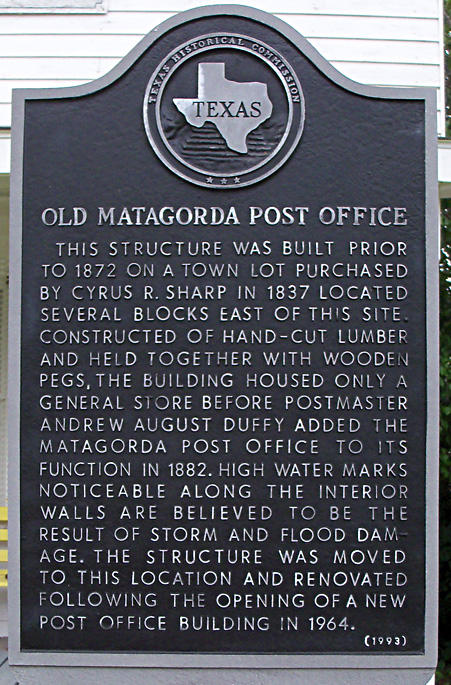|
|
||||||
|
|
||||||
|
By Kathleen Tatum
MARKER TO BE REDEDICATED
Matagorda – The old post office in this coastal community will receive another Texas Historical Marker during a special ceremony Saturday.
OLD MATAGORDA POST OFFICE
THIS STRUCTURE WAS BUILT PRIOR TO 1872 ON A TOWN LOT PURCHASED BY CYRUS R. SHARP IN 1837 LOCATED SEVERAL BLOCKS EAST OF THIS SITE. CONSTRUCTED OF HAND-CUT LUMBER AND HELD TOGETHER WITH WOODEN PEGS, THE BUILDING HOUSED ONLY A GENERAL STORE BEFORE POSTMASTER ANDREW AUGUST DUFFY ADDED THE MATAGORDA POST OFFICE TO ITS FUNCTION IN 1882. HIGH WATER MARKS NOTICEABLE ALONG THE INTERIOR WALLS ARE BELIEVED TO BE THE RESULT OF STORM AND FLOOD DAMAGE. THE STRUCTURE WAS MOVED TO THIS LOCATION AND RENOVATED FOLLOWING THE OPENING OF A NEW POST OFFICE IN 1964. (1993)
|
||||||
|
|
||||||
|
Dedicated with gratitude and respect to the citizens who have directed their wisdom, efforts and material resources to improving and maintaining Matagorda as a special place to live and to visit. The Old Post Office Building in Matagorda The old building shows good restoration and an attractive appearance in its location in the park area as a museum. Originally, the lobby had two doors, which were never locked and one window. The two service windows inside are the same, but the Dutch door has been removed from its place of service at the opposite end. The original counter was much wider than the present one; the incoming mail bags were emptied onto the counter before the mail was placed in the boxes. Most of the boxes are gone, but there are enough left to provide a good perception of the past. Originally the old post office shared a common wall with the store--with a second Dutch door between the two buildings. Good Service to the Community The old post office was of service more than for just the business of sending and receiving letters and parcel post packages. In the 1920s the daily newspapers from Houston came by mail only, and the weekly county newspaper from Bay City was eagerly anticipated also because of its uniquely entertaining column about Matagorda events and people. In addition to being a focal point for visiting, the post office had a wall clock which was the unofficial accurate timepiece for all. The clock was kept accurate by frequent telephone calls to the railroad station. Patrons came for mail, to visit, and to set their watches. In those days there were few telephones and fewer ratios to use for determining the correct time of day or to reply on for special news. In the mid 1920s the school bus loaded and unloaded the students for Gulf High School at the post office, with the lobby handy for protection from severe weather. The lobby offered a community bulletin board and a shelf for writing and sorting. Matagorda News 1858 - 1912 Matagorda News 1913 - 1937 Special Services NOT Provided by Most Post Offices The postal clerks had to complete all government-required applications for money orders instead of the patrons doing that. It was not unusual for the postal clerks to help patrons with paper work in connection with ordering merchandise from mail order catalogs. Mail was readily handed to patrons who could not master the combination locks to their boxes. After the post office closed each day at 5 p. m., in compliance with government regulations, mail and packages were handed to patrons after 5 p. m. when they entered the store and made that request. One sweet lady was never known to come for her mail order prior to the 5 p. m. closing, and she never thought of trying to learn the combination to her box. Many people needed all kinds of help at the post office, and my Dad and the kind lady clerks were always glad to be of service when they could. Lots of Burned Matches But Never a Flag Early in life I was introduced to the broom, and when sweeping the post office lobby floor I noticed many burned matches and wondered why so many people lighted cigarettes and cigars and pipes inside the lobby. I was told that people used matches for vision when working the combinations to the locked boxes at night. After electricity came to town, the lobby was lighted around the clock. Seven Days A Week Service The mail arrived by jitney from Bay City promptly at 1:30 p. m. and was placed in the boxes seven days a week except on the few government-observed holidays. Part of my employment, if you can call it that, was to help my Dad put up the mail on Sundays. When I first started that, I would have to crawl up on the counter to reach the higher-located boxes. There were always many people on hand to get their mail on Sundays--to visit, to check on local news, and to get their Sunday newspapers. It was important to find out the latest trouble poor Ella Cinders was experiencing and what kind of mischief the Katzenjammer Kids were into. Spring and Summer Sundays were often spent this way: Sunday Shcool, morning church services, fried chicken for noon meal, put up the mail, head for baseball game at Gulf or Bay City or Palacios, Service League and the services at the Episcopal Church at night. For A Time, Church Services at the Post Office on Sundays For a long period of time the staff of the newly-formed church arrived most Sundays at the post office long before the mail arrived, unloaded a small portable pump organ, and had church services with singing and preaching on the sidewalk near the post office. The minister was a lady, and she always wore black clothes. I heard her say these words many times: "Go home, remove your Bible from the shelf, dust off the cobwebs and read the Scriptures." Mr. Rugeley Serrill and the Postal Inspector--"Scratch Under" Early in his manhood, and before his wonderful confectionery, "Mr. Ruge:" was employed by my grandfather to work in the post office and in the store. Old records show that "Mr. Ruge" was paid the salary of $20 a month during the period after 1910. One day when the mail was being put up, with all three service windows closed (the usual custom), a Postal Inspector from Houston came into the lobby to perform his duties. He didn't realize why the windows were closed and he hollered loudly, "Open Up." "Mr. Ruge" hollered back at him to "Scratch Under." I guess the three men all had a laugh. Mrs. L. Pennington This precious lady worked in the post office and store for my Dad, and later she was appointed to the postmaster job and served well in that capacity until her retirement. A young person in life needs more than the love and advice given by parents and grandparents, and I was very lucky to have this kind and intelligent lady when I needed guidance. She was special in many ways! Sad Problem During the Era of the Great Depression There was a large square-shaped table the parcel post packages were kept on until patrons called for them. The mail order companies were glad to send merchandise to patrons by a practice called "Cash On Delivery." The customers would pay cash to the postmaster for the C. O. D. packages, and then the postmaster would send money orders payable to the shippers along with a portion of the tag which came attached to the packages. During the Great Depression, when money was hard to come by, many patrons would anticipate having sufficient money to pay for their C. O. D. packages by the time the merchandise they needed arrived at the post office. Unfortunately, conditions prevented many patrons from having the money when the C. O. D. packages arrived and after a period of several days the shipper would send the postmaster a notice to return the package by guaranteeing the cost of return postage. (All in a day's work at the post office.) This happening was sad many times for the people who needed the merchandise, but had to spend the money for some other purpose. The Number One Patron of the Old Post Office Uncle Jimmy Williams was the person who visited the post office many times each day. He would enter the lobby, always whistling, and turn the combination to unlock his box and look in. Then, he would always pull out his pocket watch and check it against the post office clock. He always had a sharp pocket knife and loved to whittle on the bench kept on the sidewalk in front of the post office. He and others pretty well cut up one bench, and my Dad had to a replacement bench built. The new bench was whittled up over the years by making a rectangular-shaped "X" from corners to corners on the top of the bench. When the "X" was finally cut so deep that the bench was both uncomfortable and unsafe, that bench was removed; another one never appeared. Murder in the Meat Market The old post office and the old meat market are neighbors again and serving side-by-side as museum buildings in the park area. They were located close to each other in the early days of business on Fisher Street. In the 1920s there was a sizable colony of Hispanic people who earned their livings by "shucking" oysters for the two large firms engaged in the fish and oyster business. Shuckers were paid for their work with "oyster checks" (brass coins in denominations of 5˘, 25˘, and 50˘). They spent these coins at the places of business in the town, and then periodically the merchants would go to the owners of the fish and oyster firms and turn in the "oyster checks" for currency. Shuckers always carried their oyster knives and their "oyster gloves" with them. One 1920s summer day I was standing out in the front yard of our home and saw Miss Annie Dora Hawkins who worked at the post office; she was white as a sheet and crying as she was being driven home by her mother. I hurried to the post office to see whether I was needed and saw a murdered Hispanic man lying on a metal cot (from my Dad's furniture store) which was placed on the sidewalk in front of the post office. The justice of the peace arrived to hold an inquest, and I listened to this account of what happened: The victim was in the meat market for a purchase, and a much larger Hispanic man entered and began stabbing the victim with his oyster knife. Mr. Brown Watkins, the meat market operator, placed himself in between the murderer and the victim and let the victim escape out the back door of the meat market. The victim was able to walk to the back door of the post office and came in with blood all over him, and Miss Annie Dora saw him. He walked from the post office into the store and to the front of the store finding my Dad and saying: "Mr. Duffy, ____ _________ dun kilt me." Mr. Watkins was the deputy sheriff and took the suspect into custody, and he and Dad were prosecution witnesses in the court trial. Post Office Colt 38 Revolver to the Rescue During the time of the court trial in connection with the meat market murder the father and brothers of the suspect positioned themselves in the street on a Sunday afternoon in front of the home of Mr. Watkins and called out insults and threats. My Dad and I were putting the mail in the boxes, with the service windows closed, when Mr. Watkins knocked on the Dutch door and said loudly he had to have some help. His personal pistol was in need of repairs. Daddy let him in quickly and put a belt, holster, and loaded revolver on Mr. Watkins' hip before wishing him safety and Godspeed. It is my recollection that the Hispanic men found somewhere else to be after they got a good look at the old and very large Spanish-American War vintage revolver--one of the two assigned to the post office and always kept in the old wooden stationery cabinet which still resides in the post office building. Gulf, Texas During exploration activities at Big Hill, six miles east of Matagorda, Mr. Walter Biesel was the most important man with the sulphur company and came to the post office in Matagorda frequently. My Dad and Mr. Biesel became good friends, and one day Mr. Biesel said that they had found what they were looking for and that a mining operation and a town would follow. He asked my Dad to suggest a name for the town-to-be, and my Dad recommended the short name "Gulf." After verification there was no other Texas town named Gulf, the two firmed up that name. The Texas Gulf Sulphur Company was the best thing that ever happened to Matagorda, and many people were beneficiaries in several ways. The superior school system paid for by taxes leveled at the sulphur company was an outstanding contribution of that company to the area. Postmasters in the Family My Dad succeeded his father as postmaster in the first term of the Woodrow Wilson Democratic Party administration and served also through the Republican Party administration. Although he was given the job because of his earlier work as a railway mail clerk and even though he always voted the Democratic Party ticket, county politicians managed to take the postmaster job from him early in the first term of Democratic President Roosevelt. Dad didn't leave town early on Sundays, and that was a welcome change. My grandfather was Andrew August Duffy and my father Amos Emory Duffy. Sweeping Was Not My Only Duty My other early duties were (1) Using a pattern, penciling the outline of a mitten-like glove on doubled sheets of the white fabric called drilling (light weight canvas) for my Dad to sew on his heavy-duty sewing machine and for me to cut out and turn outside to inside and place the "oyster gloves" on the counter in the store for sale at 5˘ each. (2) Cutting the near-rotten thread that held the once-transparent isinglass part of the removable automobile windows (curtains) before the roll-up glass windows were added to automobiles. After I removed the worn out isinglass and the old thread, my Dad would sew n new isinglass for the customers' car windows. The fabric "drilling" was a popular item for sale in the store, and I wish I had a nickel for every yard I sold for 15˘ a yard. The "oyster gloves" were used by the shuckers on one hand to hold the oysters to prevent hand scratches from the shells and to prevent dirty liquid from fouling that one hand. This Writing
I wrote this expressly as a courtesy and a gift to two younger people
who had shown keen interests in earlier times--Kary Louise Havard and my
son, David Edward Duffy. |
||||||
|
These lists are helpful in that the the receiver of the letter was either visiting or living in the Matagorda area previous to the time the letter was received at the Matagorda Post Office. Some of the letters were probably claimed after the list appeared in the newspaper, but the receivers of others might have already moved on. LIST
OF LETTERS
LIST OF LETTERS
|
||||||

 The old post office at Matagorda, Texas, was built by
Cyrus R. Sharp, as a general store on land he purchased from John
Plunket and Charles Dale, September 2, 1837. They in turn bought the
land from Elias R. Wightman, August 14, 1837, it being a portion of lots
two and three given to him by the Proprietors of the City of Matagorda,
July 6, 1835.
The old post office at Matagorda, Texas, was built by
Cyrus R. Sharp, as a general store on land he purchased from John
Plunket and Charles Dale, September 2, 1837. They in turn bought the
land from Elias R. Wightman, August 14, 1837, it being a portion of lots
two and three given to him by the Proprietors of the City of Matagorda,
July 6, 1835. The original marker, dedicated in the mid 1960s, was stolen, according
to Kathleen Tatum of Wadsworth who did much of the research for the
marker. This ceremony, to begin at 10 a.m., will be to rededicate the
Old Matagorda Post Office. In order for a new marker to be erected,
Tatum had to go through the entire application process with the Texas
Historical Commission.
The original marker, dedicated in the mid 1960s, was stolen, according
to Kathleen Tatum of Wadsworth who did much of the research for the
marker. This ceremony, to begin at 10 a.m., will be to rededicate the
Old Matagorda Post Office. In order for a new marker to be erected,
Tatum had to go through the entire application process with the Texas
Historical Commission.